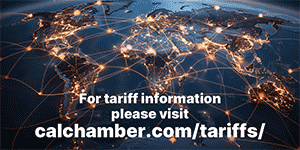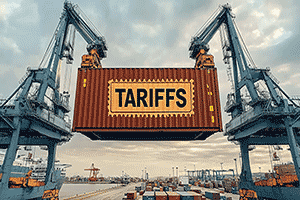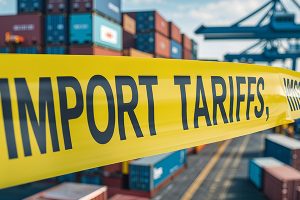Tariffs
Definition
According to the U.S. International Trade Administration, a tariff or duty (the words are used interchangeably) is a tax levied by governments on the value, including freight and insurance, of imported products. Different tariffs are applied on different products by different countries. Some countries have very high duties and taxes, and others relatively low duties and taxes.
National sales and local taxes, and in some instances customs fees, are often charged in addition to the tariff. The tariff, along with the other assessments, is collected at the time of customs clearance in the foreign port. Tariffs and taxes increase the cost of a product to the foreign buyer and may affect a product’s competitiveness in the market. (Trade.gov).
Summary
The Trump administration promised the most disruptive change in Washington, D.C. ever seen. From the inaugural speech and into the early part of the new administration, there is much speculation about the extent tariffs may be used in three ways: to protect domestic industries from the unfair practices of foreign companies and foreign markets, raise revenue for the federal budget, and as leverage in foreign negotiations rather than the use of sanctions.
President Donald Trump stated in the inaugural speech, “I will immediately begin the overhaul of our trade system to protect American workers and families. Instead of taxing our citizens to enrich other countries, we will tariff and tax foreign countries to enrich our citizens.
The America First Trade Policy released on January 20 is directed to nine government entities. It states: “Americans benefit from and deserve an America First trade policy. Therefore, I am establishing a robust and reinvigorated trade policy that promotes investment and productivity, enhances our Nation’s industrial and technological advantages, defends our economic and national security, and — above all — benefits American workers, manufacturers, farmers, ranchers, entrepreneurs, and businesses.”
CalChamber Position
The CalChamber will continue to focus on lowering and eliminating tariff and nontariff barriers to support the expansion of American exports. While strategic use of tariffs or the threat of tariffs may be a meaningful negotiation tool, the CalChamber supports efforts to reduce taxation and regulatory burden as a means to create jobs and economic growth. Further, a focus on trade agreements instead will ultimately lower both tariff and nontariff barriers and help create long-term, sustainable economic growth.
The CalChamber opposes protectionist measures which create uncertainty, disrupt global supply chains, raise consumer prices, limit choices of products for consumers, hinder the competitiveness of California businesses, and invite retaliation.
The CalChamber believes strengthening economic ties and enhancing regulatory cooperation through agreements with our top trading partners that encompass both goods and services, including financial services, is essential to eliminating unnecessary regulatory divergences that may act as a drag on economic growth and job creation.
The CalChamber seeks commercially meaningful outcomes in negotiations with regions around the world and supports bilateral, regional and multilateral trade agreements, which are critical to consumers, workers, businesses, farmers and ranchers, and would allow the United States to compete with other countries that are negotiating agreements with each other.
California’s economy is diverse, and the state’s prosperity is tied to exports and imports of both goods and services by California-based companies, to exports and imports through California’s transportation gateways, and to movement of human and capital resources.
International trade and investment are major parts of our economic engine that broadly benefit businesses, communities, consumers, and state government.
Articles
CalChamber
CalChamber
US and China Pause Port Fees
CalChamber, November 7, 2025
U.S. Imposes New Fees on Chinese Ships
CalChamber, October 17, 2025
Executive Order Will Levy Duties on Low-Value Imports from World At-Large
CalChamber, August 22, 2025
Details Change but Tariffs a Key Priority for Trump Administration
CalChamber, August 1, 2025
President Trump Revises, Delays Tariffs
CalChamber, July 11, 2025
CalChamber Urges: Address Expected Port Congestion, Supply Chain Disruptions
CalChamber, June 27, 2025
Trump Tariffs Remain Despite Legal Challenge
CalChamber, May 30, 2025
Talk of Tariffs Keeps Global Connections in Spotlight for World Trade Month 2025
CalChamber, May 2, 2025
Tariff Tumult Continues in April
CalChamber, April 25, 2025
CalChamber on Tariffs: Unnecessary Cost Hikes Hurt Business, Impact Consumers and Disrupt Global Supply Chains
CalChamber, April 16, 2025
Trump Orders New ‘Reciprocal Tariffs’
CalChamber, April 4, 2025
Trade Policy Expert Details Economic Impacts of Newly Declared Tariffs
CalChamber, March 11, 2025
Trump Tariffs: Some Put on Hold, Others Take Effect
CalChamber, February 4, 2025
Trump Tariff Plans Cause Concern, Much Speculation
CalChamber, January 31, 2025
White House
White House
Fact Sheet: President Donald J. Trump Adjusts Imports of Timber, Lumber, and Their Derivative Products into the United States
The White House, December 31, 2025
To Implement the United States-Israel Agreement on Trade in Agricultural Products and for Other Purposes
The White House, December 29, 2025
Modifying the Scope of Tariffs on the Government of Brazil
The White House, November 20, 2025
Fact Sheet: President Donald J. Trump Solidifies Economic and Defense Partnership with the Kingdom of Saudi Arabia
The White House, November 18, 2025
Modifying the Scope of the Reciprocal Tariff with Respect to Certain Agricultural Products
The White House, November 14, 2025
The United States Signs Technology Prosperity Deals with Japan and Korea
The White House, October 29, 2025
Memorandum of Understanding Between the Government of the United States of America and the Government of the Republic of Korea regarding
the U.S.-ROK Technology Prosperity Deal
The White House, October 29, 2025
Fact Sheet: President Donald J. Trump Brings Home More Billion Dollar Deals During State Visit to the Republic of Korea
The White House, October 29, 2025
Memorandum of Cooperation Regarding the Technology Prosperity Deal Between the Government of the United States of America and the Government of Japan U.S. – Japan Technology Prosperity Deal
The White House, October 28, 2025
Fact Sheet: President Donald J. Trump Drives Forward Billions in Investments from Japan
The White House, October 27, 2025
Implementation of the Agreement Toward a NEW GOLDEN AGE for the U.S.-Japan Alliance
The White House, October 27, 2025
Fact Sheet: President Donald J. Trump Secures Peace and Prosperity in Malaysia
The White House, October 26, 2025
Memorandum of Understanding Between the Government of the United States of America and the Government of Malaysia Concerning Cooperation to Diversify Global Critical Minerals Supply Chains and Promote Investments
The White House, October 26, 2025
Memorandum of Understanding Between the Government of the United States of America and the Government of the Kingdom of Thailand Concerning Cooperation to Diversify Global Critical Minerals Supply Chains and Promote Investments
The White House, October 26, 2025
Joint Declaration by the Prime Minister of the Kingdom of Cambodia and the Prime Minister of the Kingdom of Thailand on the outcomes of their meeting in Kuala Lumpur, Malaysia
The White House, October 26, 2025
Fact Sheet: President Donald J. Trump Closes Billion-Dollar Deals with Australia
The White House, October 20, 2025
Adjusting Imports of Medium- And Heavy-Duty Vehicles, Medium- And Heavy-Duty Vehicle Parts, And Buses into The United States
The White House, October 17, 2025
Fact Sheet: President Donald J. Trump Addresses the Threat to National Security from Imports of Medium and Heavy-Duty Vehicles, Parts, and Buses
The White House, October 17, 2025
Adjusting Imports of Timber, Lumber, and their Derivative Products
into the United States
The White House, September 29, 2025
Fact Sheet: President Donald J. Trump Addresses the Threat to National Security from Imports of Timber, Lumber, and Their Derivative Products
The White House, September 29, 2025
Fact Sheet: The U.S.-UK Special Relationship
The White House, September 19, 2025
President Trump Signs Technology Prosperity Deal with United Kingdom
The White House, September 18, 2025
Memorandum of Understanding Between the Government of The United States of America and the Government of The United Kingdom of Great Britain and Northern Ireland Regarding the Technology Prosperity Deal
The White House, September 18, 2025
Fact Sheet: President Donald J. Trump Modifies the Scope of Reciprocal Tariffs and Establishes Procedures for Implementing Trade Deals
The White House, September 5, 2025
Modifying The Scope of Reciprocal Tariffs and Establishing Procedures for Implementing Trade and Security Agreements
The White House, September 5, 2025
Fact Sheet: President Donald J. Trump Implements a Historic U.S.-Japan Framework Agreement
The White House, September 4, 2025
Joint Statement on U.S.-China Economic and Trade Meeting in Stockholm
The White House, August 11, 2025
Further Modifying Reciprocal Tariff Rates to Reflect Ongoing Discussions with The People’s Republic of China
The White House, August 11, 2025
Fact Sheet: President Donald J. Trump Continues the Suspension of the Heightened Tariffs on China
The White House, August 11, 2025
Addressing Threats to The United States by the Government of the Russian Federation
The White House, August 6, 2025
Fact Sheet: President Donald J. Trump Addresses Threats to the United States by the Government of the Russian Federation
The White House, August 6, 2025
Further Modifying the Reciprocal Tariff Rates
The White House, July 31, 2025
Fact Sheet: President Donald J. Trump Further Modifies the Reciprocal Tariff Rates
The White House, July 31, 2025
Fact Sheet: President Donald J. Trump Continues Enforcement of Reciprocal Tariffs and Announces New Tariff Rates
The White House, July 7, 2025
Extending the Modification of the Reciprocal Tariff Rates
The White House, July 7, 2025
Fact Sheet: President Donald J. Trump Increases Section 232 Tariffs on Steel and Aluminum
The White House, June 3, 2025
Adjusting Imports of Aluminum and Steel into the United States
The White House, June 3, 2025
Modifying Reciprocal Tariff Rates to Reflect Discussions with the People’s Republic of China
The White House, May 13, 2025
General Terms for the United States of America and the United Kingdom of Great Britain and Northern Ireland Economic Prosperity Deal
United States Trade Representative, May 9, 2024
Fact Sheet: President Donald J. Trump Incentivizes Domestic Automobile Production
The White House, April 29, 2025
Amendments To Adjusting Imports Of Automobiles And Automobile Parts Into The United States
The White House, April 29, 2025
EO: Addressing Certain Tariffs On Imported Articles
The White House, April 20, 2025
Modifying Reciprocal Tariff Rates to Reflect Trading Partner Retaliation and Alignment
The White House, April 9, 2025
Amendment to Reciprocal Tariffs and Updated Duties as Applied to Low-Value Imports from the People’s Republic of China
The White House, April 8, 2025
Report to the President on the America First Trade Policy Executive Summary
The White House, April 3, 2025
Regulating Imports with a Reciprocal Tariff to Rectify Trade Practices that Contribute to Large and Persistent Annual United States Goods Trade Deficits
The White House, April 2, 2025
Fact Sheet: President Donald J. Trump Declares National Emergency to Increase our Competitive Edge, Protect our Sovereignty, and Strengthen our National and Economic Security
The White House, April 2, 2025
Adjusting Imports of Automobiles and Automobile Parts into the United States
The White House, March 26, 2025
Fact Sheet: President Donald J. Trump Adjusts Imports of Automobiles and Automobile Parts into the United States
The White House, March 26, 2025
Fact Sheet: President Donald J. Trump Adjusts Tariffs on Canada and Mexico to Minimize Disruption to the Automotive Industry
The White House, March 6, 2025
Fact Sheet: President Donald J. Trump Proceeds with Tariffs on Imports from Canada and Mexico
The White House, March 3, 2025
Fact Sheet: President Donald J. Trump Imposes Tariffs on Imports from Canada, Mexico and China
The White House, February 1, 2025
America First Trade Policy
The White House, January 20, 2025
The Inaugural Address
The White House, January 20, 2025
CalChamber Guest Commentaries
CalChamber Guest Commentaries
UK Ready to Do Business with California
Tammy Sandhu MBE, Consul General to the British Consulate General
of San Francisco, May 23, 2025
Challenges/Opportunities for California’s Trading Relationships Across the Americas
Richard Kiy, President and CEO of the Institute of the Americas
in La Jolla, California, March 28, 2025
Guest Commentary: Stronger Together:
German American Trade Relations in a Changing World
Oliver Schramm, Consul General of the Federal Republic of Germany in San Francisco, March 18, 2025
Guest Commentary: Perspective on Impact of New U.S. Tariffs on Mexico
Christian Tonatiuh González Jiménez, Consul General of Mexico
in Sacramento, March 4, 2025
Guest Commentary: The True Cost of U.S. Tariffs on Canada
Rana Sarkar, Consul General of Canada in Northern California, February 25, 2025
Trade Agreements
Joint Statement on Framework for United States-El Salvador Agreement on Reciprocal Trade
The White House, November 13, 2025
Joint Statement on Framework for United States-Ecuador Agreement on Reciprocal Trade
The White House, November 13, 2025
Joint Statement on Framework for United States-Guatemala Agreement on Reciprocal Trade
The White House, November 13, 2025
Joint Statement on Framework for a United States-Argentina Agreement on Reciprocal Trade and Investment
The White House, November 13, 2025
United States-Japan Framework for Securing the Supply of Critical Minerals and Rare Earths through Mining and Processing
The White House, October 27, 2025
Joint Statement on United States-Vietnam Framework for an Agreement on Reciprocal, Fair, and Balanced Trade
The White House, October 26, 2025
Agreement Between the United States of America and Malaysia on Reciprocal Trade
The White House, October 26, 2025
Joint Statement on United States-Malaysia Agreement on Reciprocal Trade
The White House, October 26, 2025
Joint Statement on United States-Cambodia Agreement on Reciprocal Trade
The White House, October 26, 2025
Agreement Between the United States of America and the Kingdom of Cambodia on Reciprocal Trade
The White House, October 26, 2025
Joint Statement on a Framework for a United States-Thailand Agreement on Reciprocal Trade
The White House, October 26, 2025
United States-Australia Framework For Securing of Supply in the Mining and Processing of Critical Minerals and Rare Earths
The White House, October 20, 2025
Implementing The United States–Japan Agreement
The White House, September 4, 2025
Joint Statement on a United States-European Union Framework on an Agreement on Reciprocal, Fair, and Balanced Trade
The White House, August 21, 2025
Fact Sheet: The United States and European Union Reach Massive Trade Deal
The White House, July 28, 2025
Fact Sheet: President Donald J. Trump Secures Unprecedented U.S.–Japan Strategic Trade and Investment Agreement
The White House, July 23, 2025
Fact Sheet: The United States and Indonesia Reach Historic Trade Deal
The White House, July 22, 2025
Joint Statement on Framework for United States-Indonesia Agreement on Reciprocal Trade
The White House, July 22, 2025
Fact Sheet: Implementing the General Terms of the U.S.-UK Economic Prosperity Deal
The White House, June 17, 2025
Implementing the General Terms of The United States of America-United Kingdom Economic Prosperity Deal
The White House, June 16, 2025
Fact Sheet: U.S.-UK Reach Historic Trade Deal
The White House, May 8, 2025
The Department of Commerce together with USTR Announces Historic Trade Deal with the United Kingdom to Open Markets, Raise Revenue and Strengthen Security
U.S. Department of Commerce, May 8, 2025
Legal Action
At issue is the International Emergency Economic Powers Act (IEEPA), which gives the president special authority over economic transactions during a national emergency. Historically used for foreign sanctions, Trump is the first president to use IEEPA to impose tariffs, first declaring a national emergency over the fentanyl crisis in the U.S. to impose tariffs on China, Canada and Mexico, then declaring that the U.S. trade deficit is a national emergency in order to impose high tariffs on trading partners around the world.
On June 10, 2025, the U.S. Court of Appeals for the Federal Circuit in Washington ordered President Trump’s IEEPA Tariffs via the International Emergency Economic Powers Act of 1977 can remain until the New York based Court of International Trade CIT makes a final decision on the sweeping tariffs. See the appeal here.
US Trade Court Won’t Pause Customs Process Amid Tariff Fight
Bloomberg, December 15, 2025
United States court of International Trade Opinion on Court Case
to Halt Tarriff Processing
December 15, 2025
US Supreme Court Hears Challenges to Trump Tariffs
CalChamber, November 7, 2025
Supreme Court announces it will hear challenges to Trump’s tariffs on Nov. 5
SCOTUSblog, September 18, 2025
Supreme Court agrees to hear Trump tariff case this fall
POLITICO September 9, 2025
Trump asks Supreme Court to rapidly take up tariff case – Official Document
Supreme Court of the United States, September 4, 2025
Federal appeals court strikes down major chunk of Trump’s tariffs
POLITICO, August 29, 2025
V.O.S. Selections, Inc. v. Trump
US Chamber files coalition amicus brief urging Federal Circuit to hold that IEEPA
does not permit the imposition of broad-based tariffs
U.S. Chamber of Commerce, July 8, 2025
Judge dismisses California’s lawsuit over Trump tariffs, citing jurisdiction issue
CalChamber, June 2, 2025
Trump Tariffs Remain Despite Legal Challenge
CalChamber, May 30, 2025
Governor Newsom seeks injunction to immediately stop Trump tariffs
Governor of California, May 13, 2025
House Democrats’ Litigation Task Force Challenges Trump’s Unlawful, Chaotic Imposition of IEEPA Tariffs
House Committee on the Judiciary, May 13, 2025
Board game company fights unconstitutional tariffs
Pacific Legal Foundation, April 24, 2025
A dozen states sue the Trump administration to stop tariff policy
The Associated Press, April 23, 2025
CalChamber on Tariffs: Unnecessary Cost Hikes Hurt Business, Impact Consumers and Disrupt Global Supply Chains
CalChamber, April 16, 2025
Governor Newsom files lawsuit to end President Trump’s tariffs
Governor of California, April 16, 2025
Can Trump’s Tariffs Be Undone In Court? First Lawsuit Targets ‘Liberation Day’ Orders As Conservative Lawyers Protest Policy
Forbes, April 15, 2025
V.O.S. Selections, Inc. v. Trump
Liberty Justice Center, April 14, 2025
NCLA Sues to Stop Trump Admin. from Imposing Emergency Tariffs That Congress Never Authorized
New Civil Liberties Alliance, April 3, 2025
Related News
Q&A: Impact of Tariffs on Trade in California
CalChamber, August 27, 2025
Additional Information
White House Resources
- New Tariff Requirements for 2025
U.S. Customs and Border Protection - Trade Explainer: The August 2025 US-EU Joint Statement on Trade
German Marshal Fund, August 29, 2025 - Trade Explainer: A Comparison of US Agreements With the EU, the United Kingdom, and Japan
German Marshall Fund, August 29, 2025 - News – The White House
- Briefings & Statements – The White House
- Presidential Actions – The White House
- Fact Sheets – The White House
USTR Resources
- Presidential Tariff Actions | United States Trade Representative
- USTR Opens Public Comment Process on Proposed Modifications to Certain Aspects of Section 301 Ships Action
United States Trade Representative, June 6, 2025 - USTR Releases 2025 Special 301 Report on Intellectual Property Protection and Enforcement
United States Trade Representative, April 28, 2025 - USTR Releases 2025 National Trade Estimate Report
United States Trade Representative, March 31, 2025 - U.S. Trade Representative Announces 2025 Trade Policy Agenda
United States Trade Representative, March 3, 2025 - Trade Remedies
U.S. Customs and Border Protection
Tariff Resources
- Comprehensive tariff data on the WTO website
WTO Tariff & Trade Data
World Trade Organization - Import Tariffs & Fees Overview and Resources
FTA Tariff Tool Home
Tariff Database | DataWeb
International Trade Administration
U.S. Department of Commerce - Harmonized Tariff Schedule
U.S. International Trade Commission - Trade Remedies
U.S. Customs and Border Protection - Tracking the Cost of Tariffs on U.S. Small Businesses
U.S. Chamber of Commerce - Trade Calendar
Council on Foreign Relations - Trump Tariffs: The Economic Impact of the Trump Trade War
Tax Foundation - GBA Tariff Tracker – GBA
Global Business Alliance - Tariff Resource Guide
California State Trade Expansion Program
GoBiz - Tariff Tracker
We Pay The Tariffs
California Action
- Governor Newsom secures federal court victory, Trump’s use of National Guard in Los Angeles illegal
Governor of California, September 2, 2025 - Judge dismisses California’s lawsuit over Trump tariffs, citing jurisdiction issue
CalChamber, June 2, 2025 - Governor Newsom seeks injunction to immediately stop Trump tariffs
Governor of California, May 13, 2025 - Governor Newsom files lawsuit to end President Trump’s tariffs
Office of the CA Governor and Attorney General, April 16, 2025 - Governor Newsom and Visit California launch international tourism campaign welcoming Canadians to experience the warmth and love of the Golden State
Office of the CA Governor, April 14, 2025 - Governor Newsom directs state to pursue strategic relationships with international trading partners; urges exemptions of California-made products from tariffs
Office of the CA Governor, April 4, 2025
We Pay the Tariffs
“We Pay the Tariffs is a new coalition launched to help small businesses navigate these uncertain times, raise awareness about the devastating impacts of the 2025 tariff proposals, and protect the interests of small businesses.
Our coalition will advocate for the needs of small businesses and push back against the implementation of tariffs. We Pay the Tariffs is committed to lobbying efforts, sharing real-life stories of impacted businesses, and engaging with congressional leaders to oppose harmful tariff policies.”








